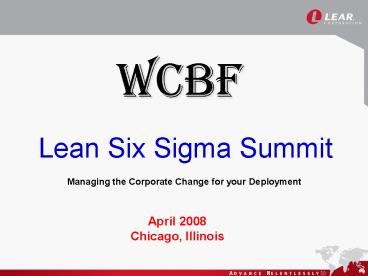SSD Lean Packaging - PowerPoint PPT Presentation
1 / 30
Title:
SSD Lean Packaging
Description:
More Than 90,000 Employees; 242 Facilities In 33 Countries ... 06 Ford Mustang. 06 Lincoln Zephyr. 06 Mercury Milan. 06 Ford Explorer. 06 Chevy Impala ... – PowerPoint PPT presentation
Number of Views:201
Avg rating:3.0/5.0
Title: SSD Lean Packaging
1
WCBF Lean Six Sigma Summit Managing the
Corporate Change for your Deployment
April 2008 Chicago, Illinois
2
Advance Relentlessly
3
Lear is a Leading Global Automotive Supplier
More Than 90,000 Employees 242 Facilities In 33
Countries
4
We Serve All the Worlds Automakers
Lear Content On Over 300 Vehicles Worldwide
5
Presentation Contents
- Why we do LMS
- Evolution of LMS / Structure
- What is needed for Deployment
- What is LMS and how it Works
- Examples of LMS at work
- Advantages to Customers
- Advantages to Suppliers
- Advantages to Lear
- What we have learned
- One Final result.
6
(No Transcript)
7
LMS Evolution
Lessons Learned
Best Practices
Toyota Production System
Lear Manufacturing Experiences
Lear Manufacturing System (LMS)
8
What is LMS
Lear Manufacturing System
- Systems Approach to Lean Deployment
- Manufacturing System
- 2 Foundations
- 4 Pillars
- Foundations, Pillars all LMS Elements are
Interdependent - Create Total Lean Behavior that provides results
oriented activity.
9
Lear Manufacturing System
Pillars
Foundation
10
Lear People Key Elements
- Training
- Operator Support
- Employee Involvement
- Heath Safety / Ergonomics
11
Lear People - Training
- Six Sigma Training
- 4 month intensive certified Black Belt
- 2 month certified Green Belt
- 6 month certified Master Black Belt
- Lean Facilitator Training
- 3 month training
- Certification via Model Area
- In-Plant Training
- Kaizen events used to teach and apply
- Events facilitated by Plant Lean Facilitator and
or Lean Master - Training records maintained by plants
12
Lear People Operator Support
- LMS works from inside out that is, from the
operator first and foremost
- Operators perform the true value added
operations and must be successful every time
13
Lear People Employee Involvement
- Our people are involved
- In all three stages of
- product launch
- Upfront design, launch and
Continuous Improvement - Designing of work stations, layouts and product
- Ergonomic and Health Safety concerns (Virtual
Cad) - Process and product changes (Design for
Manufacturing)
14
Lear People Health Safety / Ergonomics
This is our over-riding responsibility.
We create a safe and ergonomically sound, injury
free workplace for all our employees through LMS
15
Product Design - Key Elements
- Design For Six Sigma (DFSS)
- Design For Lean (DFL)
- Common Hardware / Architecture
16
Lean Design System Structure
- The use of DFM/A early in the design process is
necessary because 70 percent of the product costs
are set by the time the product leaves the
initial design team. - Any effort to reduce cost after the design stage
can only influence the remaining 30 percent of
product cost. - The greatest effect that DFM/A has is the
reduction of total part count in a product. A
reduction in the part count results in fewer
interfaces between parts and a better product.
17
Product Design Design for Six Sigma (DFSS)
DFSS, part of our overall Six Sigma
culture, is used in the product design
process to reduce overall process and product
variation.
18
Product Design Design for Lean (DFL)
- Product design teams
- understand and employ
- LMS principles in
- order to ensure that our
- product can be
- manufactured in an Lean environment.
- This includes packaging, presentation and
- flow principles that ensure operator success.
19
Product Design Common Hardware / Architecture
Common proven designs use common hardware and
architecture to reduce costs
12 million units produced to date
06 Chevy Monte Carlo
20
Housekeeping Key Elements
- 5S / Workplace Organization
- Visual Management
- Total Predictive Management (TPM)
- Standardize Work
21
Housekeeping The Cycle of Success
22
Housekeeping 5S / Workplace Organization
A LMS cornerstone. All improvements flow from
World Class Housekeeping. It must be in place in
order to execute LMS
A place for everything and everything in its
place.
23
Housekeeping Visual Management
Visual management tools control processes so that
the process speaks to the observer. From labeling
signage to data metrics review
24
Housekeeping Total Predictive Maintenance
Equipment, tools and facilities must be in
optimal operating condition in order to execute
LMS. TPM is used to ensure that capital is
maintained without wasting resources
25
Housekeeping Standardize Work
Standardized work reduces process variation and
ensures consistency in our products, processes
and delivery
26
Quality First Key Elements
- Quality at the Source (Jidoka)
- Problem Solving (PDCA)
- Six Sigma
- Error Proofing
- Manufacturing Execution Systems (MES)
27
Quality First Quality at the Source (Jidoka)
Quality at the Source (Jidoka) ensures problems
are dealt with in station and are not passed on
to downstream operations, repair loops and
most important our customers
28
Quality First Problem Solving (PDCA)
Basic Problem Solving methodology understands
that every change to the process creates other
changes and must be managed with a discipline
method
Plan-Do-Check-Act, 5 Why and 8-D methodologies
are applied on shop floor
29
Quality First Six Sigma
Six Sigma, a disciplined approach using data is
interlinked with Lean to reduce defects and
variation in all processes.
30
Quality First Error Proofing (Poka Yoke)
The best way to control error is to prevent it
in the first place. Error Proofing (Poka-Yoke)
tools are used to control process inputs and
eliminate the opportunity of failure































